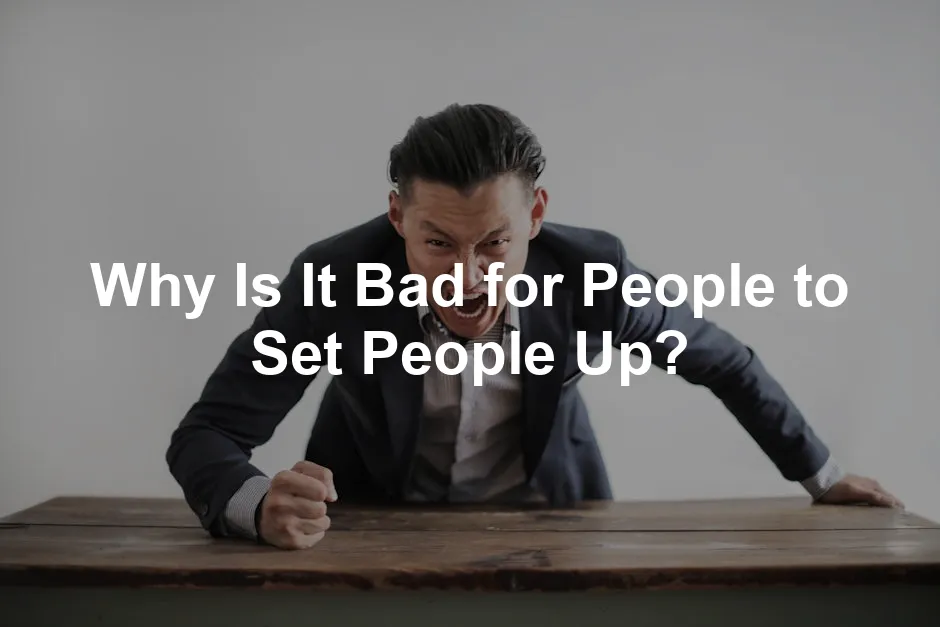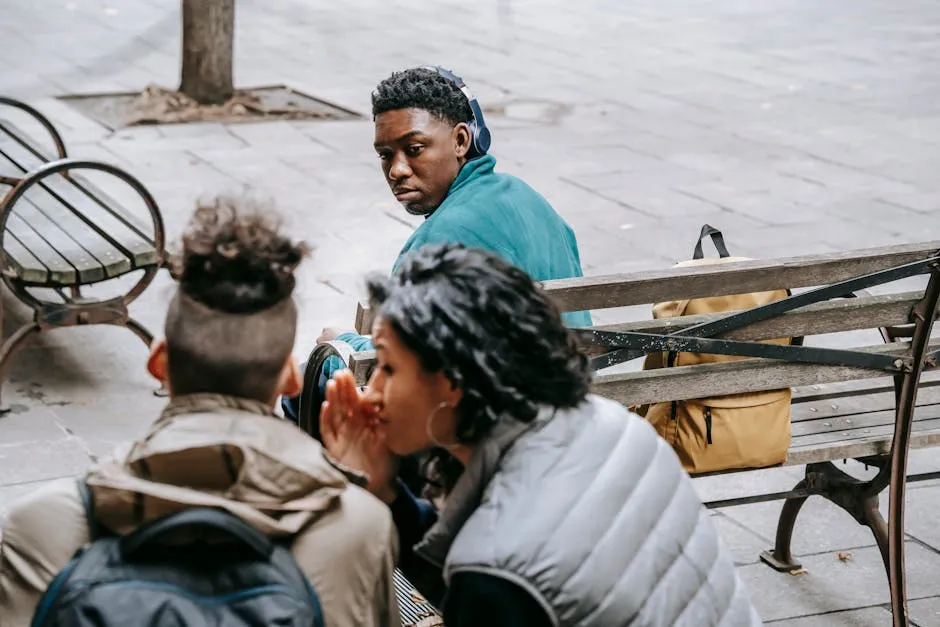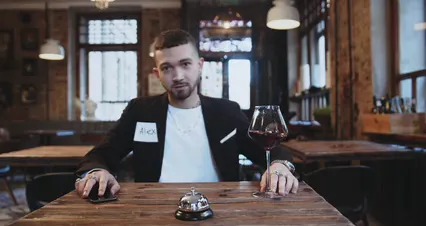
Why Is It Bad for People to Set People Up?
Introduction
In the intricate web of friendships and relationships, matchmaking appears to be a heartfelt gesture. After all, who doesn’t want to play Cupid for their friends? However, the reality often resembles a tangled knot rather than a seamless bond. Setting friends up can lead to awkward encounters, unrealistic expectations, and emotional turmoil. Instead of a fairy tale ending, you might just find yourself in a comedy of errors.
Let’s face it—when a friend plays matchmaker, things can get messy. The pressure to succeed looms over both parties. The one being set up feels like a contestant on a dating show, while the matchmaker may feel like they’ve staked their reputation. There’s an inherent risk involved, and not everyone is ready to handle it gracefully.
Moreover, compatibility is a fickle friend. Just because two people share a mutual friend doesn’t mean they’ll hit it off. It’s akin to pairing pineapple with pizza—some love it, while others find it a culinary crime! Ignoring fundamental differences in values, interests, and lifestyles can lead to disappointment. What starts as a well-intentioned setup may sour faster than milk left out in the sun.

Speaking of relationships, understanding them can be a real game changer. For some solid insights into modern dating, check out “Modern Romance” by Aziz Ansari. This book hilariously explores the complexities of dating in the digital age, helping you navigate the modern love landscape.
Let’s not forget the emotional fallout. An unsuccessful setup can strain friendships. Disappointment and embarrassment linger like a bad smell, creating awkwardness in future gatherings. No one wants to relive the moment when their friend’s date turned out to be a total dud.
Lastly, the very act of setting someone up can infringe on their autonomy. People desire to take charge of their own romantic lives. When friends intervene, it can feel like a loss of control. This resentment can breed tension, not only between the individual and the matchmaker but also within the broader circle of friends.
So, as we consider the implications of matchmaking, it’s crucial to weigh the potential chaos against the desire to help. Are you genuinely aiding your friends, or are you opening a Pandora’s box?
In the end, while the intention behind setting people up may be rooted in love, the outcomes can be anything but. Before you decide to play matchmaker, think twice. You might just be better off cheering from the sidelines.
The Psychological Dynamics of Setting Up
Understanding the Motives Behind Matchmaking
Setting up friends often comes from a place of love. Friends genuinely want to share their happiness with those they care about. But wait—what’s really behind this urge? Fear of being single plays a big role. Many feel pressured to couple up, and they want to extend that pressure to others. It’s like a group project where everyone is racing to find a partner, and no one wants to be left holding the empty bag of solitude.
Social media discussions often highlight this phenomenon. People share stories of their friends enthusiastically trying to set them up, only to face rejection. One user described how friends constantly suggested dates with guys she wasn’t interested in. The anxiety of disappointing her friends made her feel like she was being auctioned off. In her words, “I’m a big girl! Let me pick!”
Another reason is the desire to be a hero. Friends want to play matchmaker, thinking they hold the key to someone’s happiness. They envision a perfect pairing, but often overlook the unique preferences of both parties involved. What seems like a perfect match in their eyes may not resonate at all with the individual being set up. It’s like trying to fit a square peg into a round hole—no matter how hard you try, it just won’t work!

If you’re looking to understand relationships better, consider reading “Attached: The New Science of Adult Attachment” by Amir Levine. This book delves into the attachment styles that impact how we connect with others, making it a must-read for anyone navigating relationships.
The Pressure of Expectations
Once the matchmaking begins, the pressure to succeed can escalate quickly. Both individuals involved may feel as if they’re on a stage, performing for an audience. The one being set up might think, “I need to impress!” Meanwhile, the matchmaker feels the weight of expectations as their reputation hangs in the balance.
Psychological studies reveal that pressure can significantly impact performance. People often respond to expectations with anxiety, affecting their social interactions. Imagine the pressure of a first date that feels more like a job interview. This anxiety can lead to awkward silences or desperate attempts to impress. Instead of a relaxed atmosphere, the date may feel like a high-stakes game, where failure is not an option.
In reality, this pressure can backfire. Instead of forging a genuine connection, it can create a scenario where both parties leave feeling dissatisfied. They may feel they didn’t meet the expectations set for them. Anxiety looms large, making what should be a fun experience feel more like a chore.

The Risks of Incompatibility
The Dangers of Overlooking Fundamental Differences
Every matchmaker relies on certain criteria to determine compatibility. Common factors include shared interests, similar backgrounds, and mutual friends. Sounds good, right? However, these checks often miss the mark. They can lead to mismatched setups that ignore fundamental differences in values or lifestyles.
Take, for instance, two friends—one a free-spirited traveler and the other a homebody who prefers quiet nights in. While they might enjoy the same Netflix series, their lifestyles are worlds apart. A well-intentioned setup could lead to confusion and disappointment. The traveler might feel stifled, while the homebody could feel overwhelmed by their date’s adventurous spirit. What was supposed to be a fun night out turns into a classic case of “what was I thinking?”
Moreover, mismatched expectations can cause emotional turmoil. When two people come from different worlds, the clash can be jarring. Imagine someone who values punctuality paired with someone who treats time like a flexible concept. The resulting frustration can be like oil and water, never truly mixing.
In the end, it’s essential for friends to recognize that compatibility is more than just surface-level checks. It requires an understanding of deeper values and life goals. Ignoring these fundamental differences can lead to setups that are destined for failure. And that’s a recipe for awkwardness, disappointment, and strained friendships.
So, before you play matchmaker, remember the intricate landscape of human relationships. Understanding the motives, pressures, and risks involved can help you navigate the choppy waters of matchmaking. Sometimes, it’s best to let your friends find their own paths in love. After all, love should never feel like a chore!

The Impact on Friendships
Strain and Disappointment
Setting friends up can seem like a fun adventure, but it often leads to more drama than romance. Picture this: two friends, eager to matchmake, set up a blind date. What could possibly go wrong? Well, everything. Imagine the awkwardness when one friend realizes the other is not only uninterested but also finds their date utterly unappealing. Ouch!
Failed setups can create rifts in friendships. Disappointment hangs in the air like an unwanted guest. The one who orchestrated the setup might feel embarrassed. Meanwhile, the person on the date may feel the pressure to fake enthusiasm. This can lead to an uncomfortable situation where everyone leaves feeling deflated.
Consider a real-life example: a friend excitedly sets up her single buddy with a guy she met at a party. They go out, but the date turns into a disaster. The guy talks non-stop about his collection of rare stamps, while her friend can barely hold back yawns. The date ends, and awkwardness ensues. No one wants to revisit that moment.
Friendships can take a hit when expectations aren’t met. People often feel guilty about disappointing their friends. They may even place blame on themselves for not hitting it off. “Was it something I said?” they might wonder. Such thoughts can linger, creating tension in future hangouts.

And speaking of expectations, if you want to dive deeper into understanding relationships, check out “The Five Love Languages” by Gary Chapman. This book offers valuable insights into how different people express and receive love, helping you navigate romantic relationships more effectively.
Moreover, the friendship dynamics shift. The matchmaker may feel responsible for the aftermath. That sense of guilt can sour even the closest of bonds. Friends who once laughed together now find themselves avoiding specific topics. What once was a vibrant relationship can feel like a tightrope walk, balancing the desire to reconnect without revisiting the past mishap.
Navigating Awkwardness
So, what do you do when a setup doesn’t pan out? First, acknowledge the elephant in the room. It’s crucial to have an open conversation about what happened. Ignoring the awkwardness only makes it worse. A little humor can go a long way. “Well, that was a plot twist I didn’t see coming!” can lighten the mood.
Next, reassure your friend that it’s not the end of the world. Remind them that dating is a numbers game. Not every first date will lead to love. It’s perfectly okay to laugh about the experience later. “Remember that time you set me up with Mr. Stamp Collector?” can become a hilarious inside joke.
Finally, suggest a new activity together. A fun outing can help mend any tension. Whether it’s a cozy movie night or a light-hearted board game session, these moments can reinforce the bond. By focusing on shared experiences, friends can gently redirect their attention away from the failed setup.
In conclusion, while matchmaking can create challenges, it doesn’t have to spell disaster for friendships. With open communication, a sprinkle of humor, and shared activities, friends can navigate the awkwardness together, emerging stronger than before. Who knows? The next time might just be a perfect match!

Autonomy and Control
The Importance of Personal Choice in Dating
When friends decide to set someone up, it can feel like a takeover of personal choices. Imagine being handed a menu where every dish is something you didn’t order. It’s frustrating, right? Being set up on a date can rob individuals of their autonomy, leaving them feeling like marionettes in someone else’s play.
Many people cherish their independence when it comes to dating. They want to call the shots, choosing who they connect with based on their own preferences. When a friend steps in, it can create a sense of loss. Suddenly, you’re expected to fit into a mold created by someone else. That’s not just disappointing; it can lead to feelings of resentment.
Resentment arises when choices are made for us. Individuals may find themselves grumbling, “Why can’t I choose who I want to date?” These feelings can fester, creating tension not only between the matchmaker and the individual but also within the broader friend group. It’s like a game of musical chairs, but the music stops, and you’re left standing awkwardly while everyone else has a seat.

If you’re looking to enhance your self-advocacy skills, consider reading “How to Win Friends and Influence People” by Dale Carnegie. This classic book teaches effective communication and relationship-building skills that can empower you in all aspects of life, including your dating journey.
Encouraging Self-Advocacy
So, how can individuals reclaim their dating lives? It starts with self-advocacy. Communicating preferences to friends is essential. Here are some tips to help navigate this tricky territory:
- Be Open and Honest: Share your dating preferences with friends. Let them know your likes, dislikes, and deal-breakers. This transparency can help them understand your perspective.
- Set Boundaries: If you’re not interested in being set up, say it! Politely let friends know that you’d prefer to find dates on your own. Setting boundaries is about asserting your autonomy.
- Invite Collaboration: Instead of outright rejecting setups, suggest group outings. This way, you can meet new people without the pressure of a one-on-one date.
- Own Your Journey: Remember, you’re in charge of your dating life. Embrace the idea that finding love is a personal journey. Celebrate your independence and enjoy the ride.
Owning one’s dating life is empowering. It allows individuals to take control and seek out connections that genuinely resonate with them. After all, the path to love should be paved with personal choices, not dictated by someone else’s vision.

The Social Dynamics of Group Settings
The Complications of Group Interactions
Setting up friends often happens in a group environment. Think of the awkward tension when everyone’s watching the date unfold. Group dynamics can complicate interactions significantly. It’s hard to be genuine when mutual friends are present, and the pressure to perform can be overwhelming.
Imagine two people trying to connect while surrounded by a gaggle of friends, all eager to chime in. The natural flow of conversation can feel stifled. It’s difficult to create a genuine connection when you’re worried about how you’re being perceived. Instead of focusing on each other, both parties might end up playing to the crowd, which can lead to forced interactions.
Moreover, the presence of mutual friends can create an imbalance of social power. If one person knows everyone in the group, the other might feel overshadowed. This imbalance can hinder authentic exchanges, leaving both parties feeling disconnected. It’s like trying to have a deep conversation at a lively party—nearly impossible!
Setting up friends in a group can feel more like a social experiment than a genuine date. The pressure to impress, combined with the audience effect, often leads to awkward moments rather than authentic connections. So, while the idea of matchmaking in a group setting might seem fun, the reality can be quite different. It’s crucial to navigate these dynamics thoughtfully to foster genuine connections rather than forced encounters.

Strategies for a Positive Setup
Creating a supportive environment for connections can make all the difference. Here are some practical tips to ensure your matchmaking efforts hit the mark:
- Ask for Permission: Before playing matchmaker, check in with your friends. A simple, “Hey, would you be open to a setup?” goes a long way. Consent is key!
- Focus on Common Interests: Instead of just aiming for two single friends, consider their personalities and hobbies. Shared interests build a stronger foundation for connections.
- Suggest Double Dates: Double dates can alleviate pressure. They provide a casual setting where everyone can relax. Plus, laughter is the best icebreaker!
- Host Group Meet-Ups: Casual gatherings with larger groups can be low-pressure. Think game nights, picnics, or trivia contests. These environments foster natural interactions without the intensity of a one-on-one date.
- Monitor the Vibe: Pay attention to how both parties interact. If you sense sparks, great! If not, it’s okay to pivot. Flexibility is crucial.
- Keep It Light: Remind everyone that it’s just a date! No need for grand expectations. A laid-back attitude can lead to unexpected connections.
- Encourage Feedback: After the setup, check in with both parties. Ask how it went. This can help you refine your matchmaking skills for the future.
By implementing these strategies, you create a nurturing atmosphere for connections. Remember, the goal is to support your friends in their romantic endeavors, not to pressure them. A little thoughtfulness goes a long way in matchmaking!

Conclusion
Setting people up with good intentions can often lead to unforeseen consequences. While the desire to help friends find love is commendable, the potential pitfalls can outweigh the benefits. By acknowledging the complexities of matchmaking, we can foster healthier, more authentic relationships.
First, let’s consider the pressure that often comes with being set up. Both parties may feel anxious, as if their compatibility is under scrutiny. When expectations are sky-high, the pressure can cause awkwardness rather than chemistry. It’s essential to remind friends that dating should be fun, not a performance.
Then, think about compatibility. Just because two people are single and know you doesn’t guarantee they’ll click. Fundamental differences in lifestyles, values, and interests can lead to mismatched expectations. It’s crucial to recognize that compatibility goes beyond surface-level traits.
Friendship dynamics can also take a hit. An unsuccessful setup may stir disappointment, leading to lingering awkwardness. No one wants to relive the moment when a friend’s date turned out to be a total dud. A little humor can help, but the disappointment often lingers.
Moreover, autonomy is a significant factor. Individuals want to navigate their own dating lives. When friends intervene, it can feel like a loss of control. This can breed resentment towards the matchmaker and even the date. Encouraging self-advocacy is vital for maintaining healthy relationships.
As we navigate the intricate world of dating, let us remember that each individual’s journey is unique. Sometimes, the best way to support our friends is simply to cheer them on from the sidelines. Instead of orchestrating setups, consider being a supportive friend who listens, encourages, and celebrates their journey. After all, love should be an adventure, not a chore!

FAQs
Is it ever okay to set people up?
Setting people up can be appropriate in certain contexts. If both individuals are interested and consent to the setup, it may work. The key is to ensure compatibility and respect each person’s autonomy.
How should I handle it if a setup goes wrong?
If a setup doesn’t work out, address it openly. A light-hearted approach can ease tension. Reassure your friend that it’s okay and explore new activities together to shift the focus.
What if I want to be set up?
If you’re open to being set up, communicate that desire with friends. Share your preferences and interests. This can guide them in finding suitable matches while respecting your autonomy.
Can successful setups happen?
Yes, successful setups can occur! When both parties share interests and have mutual consent, it can lead to meaningful connections. However, always approach with care and consideration to avoid potential pitfalls.
Please let us know what you think about our content by leaving a comment down below!
Thank you for reading till here 🙂
And if you’re looking to spice up your home life while navigating these relationship dynamics, consider adding a Himalayan Salt Lamp to your space. Not only do they look great, but they also create a calming atmosphere—perfect for those post-date reflections!
All images from Pexels




